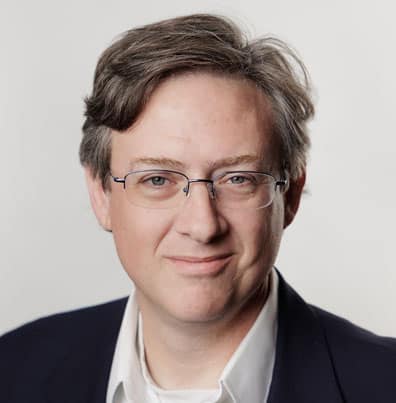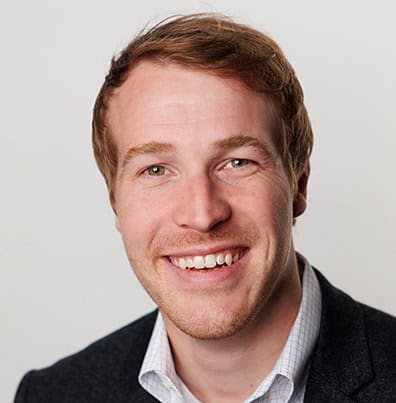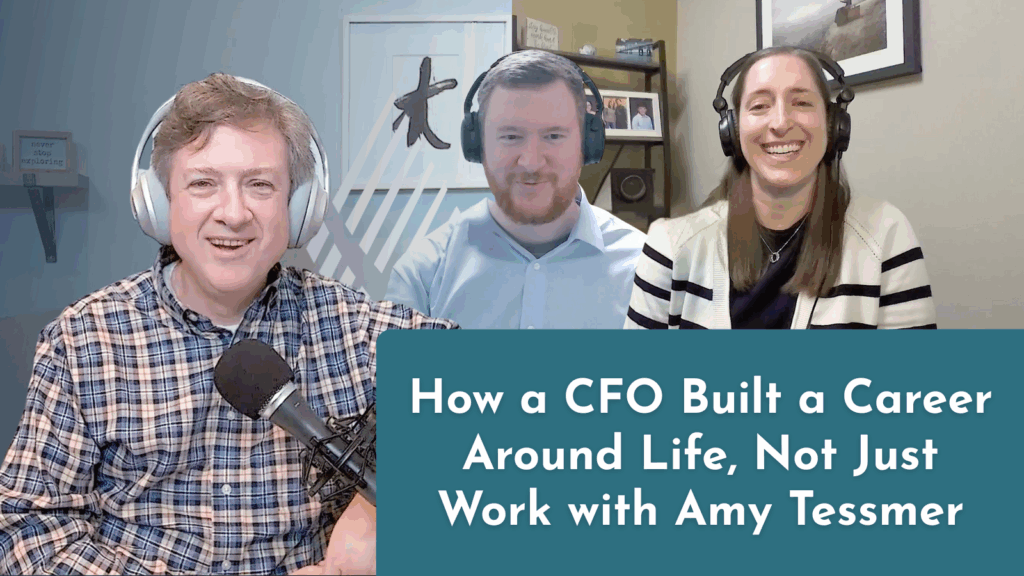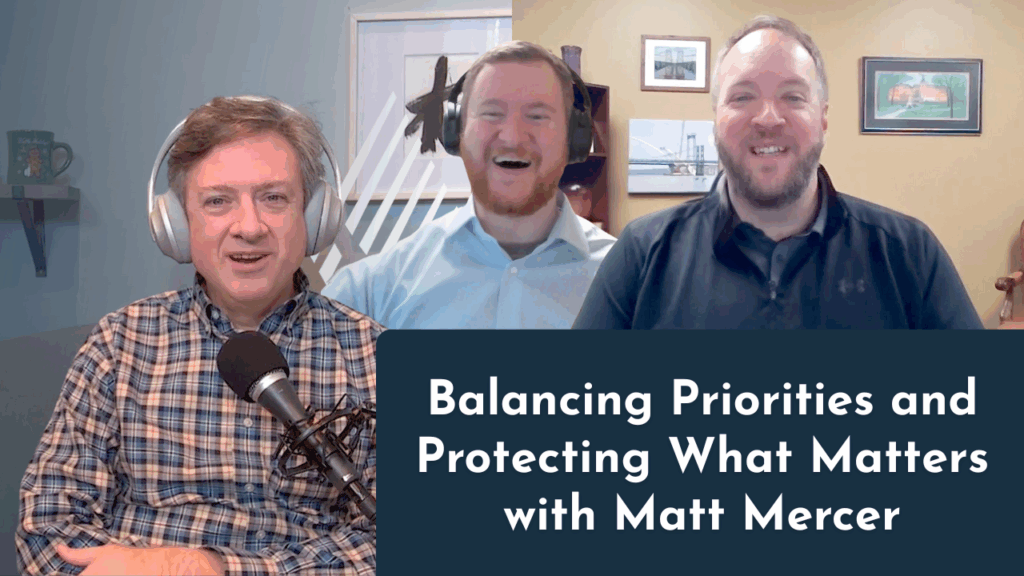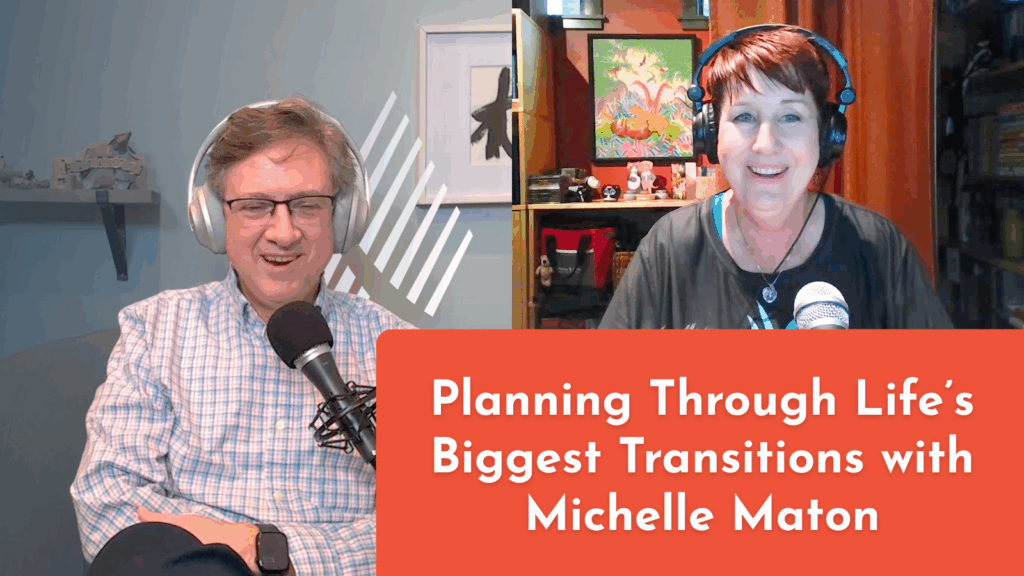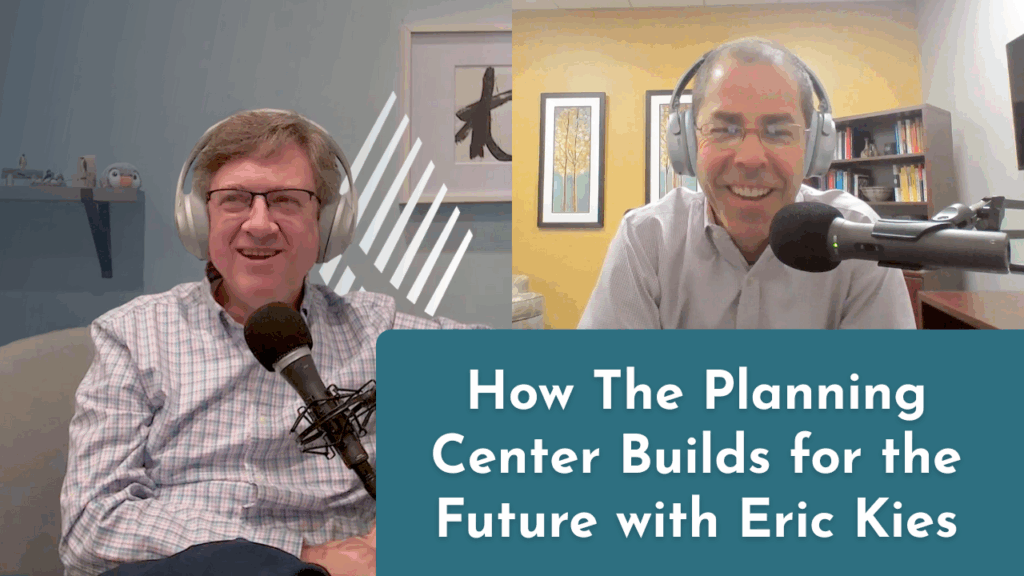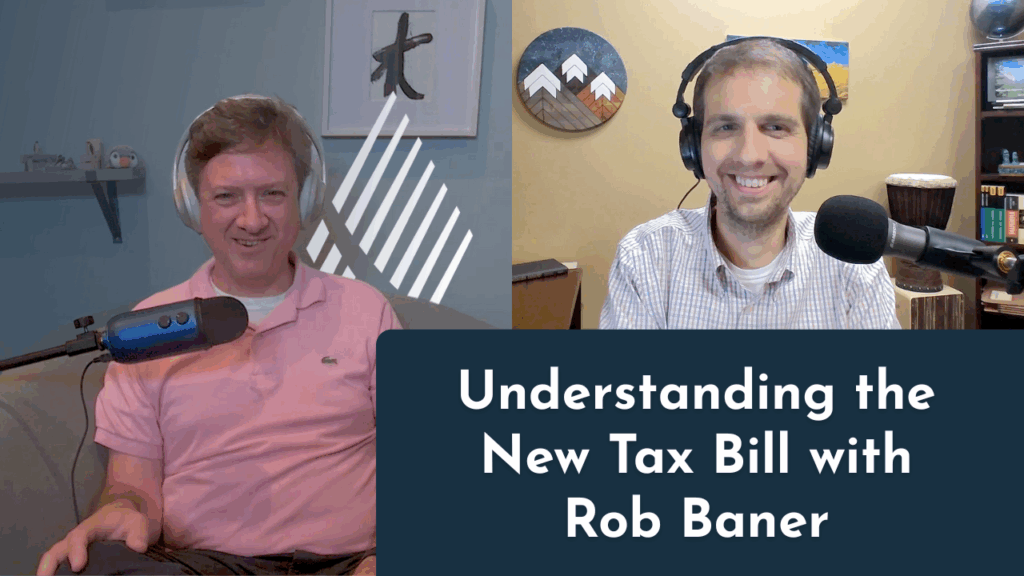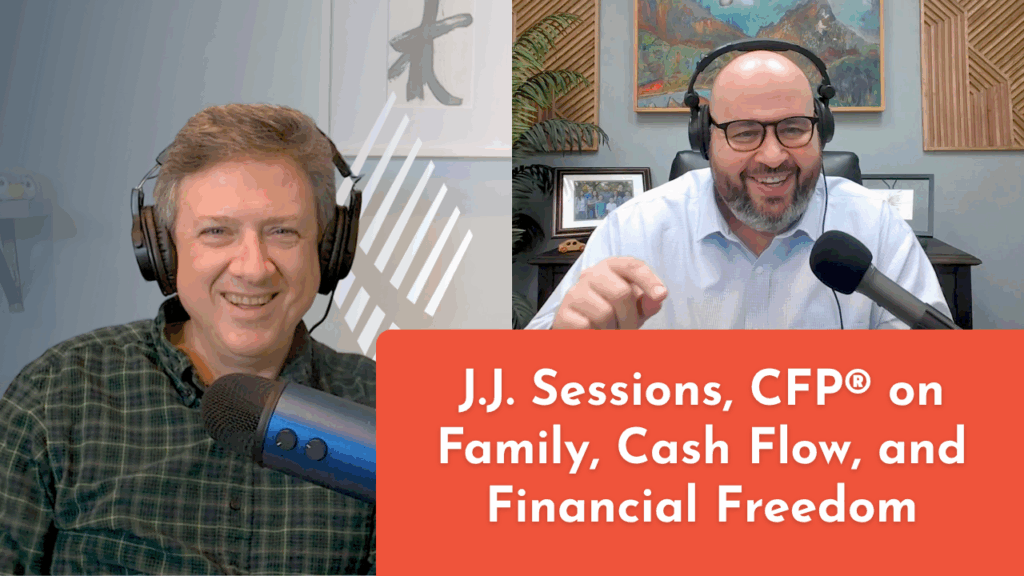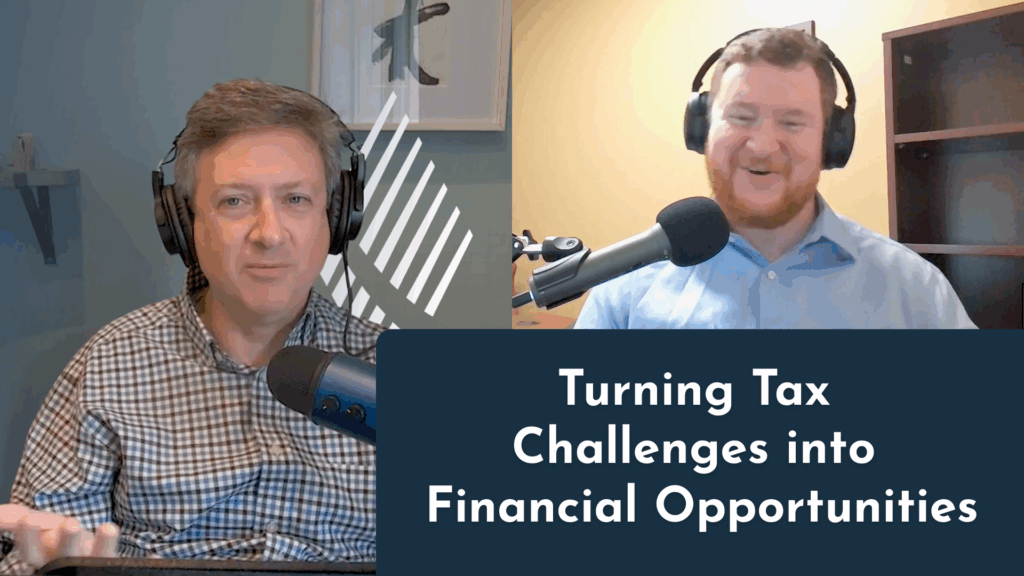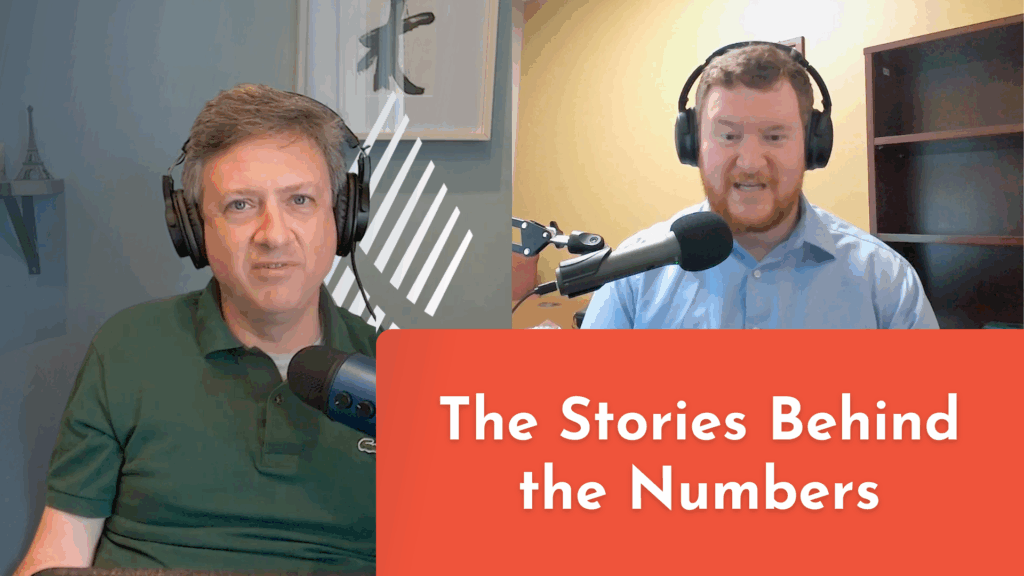[00:00:00] Patrice Sikora: Every number on a balance sheet tells a story, late nights spent building something meaningful, the risks taken, the difficult conversations, the lessons learned along the way. But true wealth is not measured in dollars. It’s woven into the stories that we create, the experiences that shape us, and the memories that outlive us.
[00:00:21] Patrice Sikora: Welcome to the Living Beyond Numbers Podcast with Jude Boudreaux from the Planning Center. This show is not about spreadsheets and financial jargon. It’s about real conversations and powerful stories. That help you align your money with your values, your dreams, and your legacy. Because at the end of the day, it’s not about how much you have, it’s about the life you wanna live and the stories you leave behind.
[00:00:46] Patrice Sikora: Now onto the show.
[00:00:50] Jude Boudreaux: Welcome everybody. Uh, excited to have you here for another episode of our Living Beyond the Numbers podcast. I’m your host, Jude Boudreaux, here with director of [00:01:00] Positivity, Caleb Arringdale.
[00:01:01] Caleb Arringdale: Hello.
[00:01:02] Jude Boudreaux: And today we’re joined by Matt Knoll, who’s, uh, one of our shareholders. He’s a senior financial planner in our office in Moline, Illinois, in the Quad Cities area.
[00:01:11] Jude Boudreaux: Uh, Matt is also the chair and leads our investment committee. Um, and he is our lead trainer for the new financial planners who join our teams. So, um, really a wealth of knowledge and plays a lot of important roles for our firm. So, Matt, welcome.
[00:01:24] Matt Knoll: Yeah, excited, uh, to be here and, uh, be on the early, uh, episodes of this podcast.
[00:01:31] Matt Knoll: Uh, I think it’s, uh, got some cool futuristic outlooks for it too, so
[00:01:37] Jude Boudreaux: thanks. Yeah. I’m hoping it’ll be a, a, a neat new thing for us in a way. You know, we all talk about the team and I know how we interact, but hopefully a way to bring some of that backstage forward to the front stage for our clients.
[00:01:50] Matt Knoll: Yeah, there’s certainly, uh.
[00:01:52] Matt Knoll: Certainly enough that goes on behind the scenes. So, uh, yeah. Excited about it. All right, great. So yeah, Matt, I mean, why don’t you just,
[00:01:59] Jude Boudreaux: I mean, paint us a [00:02:00] little picture, tell us a little bit about you. Sure.
[00:02:02] Matt Knoll: Yeah. So, um, yeah, I’ve been with the planning center for like 12 years, uh, full time, but then also add in a little extra as a intern and, uh, uh, work in our Moline office and live in the quad cities.
[00:02:18] Matt Knoll: And, um. I really kind of enjoy the, the community aspect of that. And, uh, also in my personal life, got some kids that I wrangle around and, uh, involved in the music scene, uh, play in a, a band locally and then involved on like a, a board for a community music, uh, charity, uh, organization as well. So, uh, pretty exciting stuff.
[00:02:46] Matt Knoll: And, um. It’s a little bit about me.
[00:02:49] Caleb Arringdale: Quick question on that then. So, so many of the people here at TPC are musicians of some variety, so why do you think that is? Why, why are so many of us somehow involved in the music scene?
[00:02:59] Matt Knoll: [00:03:00] That is a good question. You know, it’s uh, sometimes. I don’t know. It’s kind of weird to think about it like this, but there can be like a synergy in music, I think, and maybe some of that is overflowed and connected outside of the actual music itself, but the, that maybe synergy still exists.
[00:03:20] Matt Knoll: Um, and just like-minded people with similar interests somehow found, found themselves working together. Yeah.
[00:03:30] Jude Boudreaux: Yeah, I mean, there is definitely a, you know, we talk about our practice being an ensemble, which is, you know, in a musical term. And, um, yeah, there’s a lot of collaboration that goes on in here too.
[00:03:39] Jude Boudreaux: So maybe that, you know, wanted as part of that, that, uh, embeds itself in here. So, um, so Matt, yeah. You mentioned, obviously you’ve been working here full-time for a while, but you had some part-time stints before, so kind of how did it start with the planning center?
[00:03:53] Matt Knoll: Yeah. Um, well, I guess you gotta go back to college.
[00:03:58] Matt Knoll: So shout out to Iowa State [00:04:00] University. That’s where I, uh, did my undergrad and, uh. You know, I, I started looking for internships, um, while I was in college. And I interviewed with a few places, couple big firms that said, Hey, can you give me a list of 200 people to contact and sell insurance to? And uh, I had a very different experience when interviewing with the planning center.
[00:04:26] Matt Knoll: So, uh, that’s kind of where I got started. And. I really enjoyed the process and in fact, my folks were clients of the planning center, um, as well, which was kind of my first exposure, uh, to, to what we do and, and Marty, who’s our founder and, uh, getting involved with Planning Center. So.
[00:04:48] Jude Boudreaux: Yeah. Well and glad you brought up Marty there ’cause I was gonna ask about that.
[00:04:51] Jude Boudreaux: So Marty founded the Quad City’s office that, you know, became, was named the original name of the planning center, and then we’ve brought in these other [00:05:00] offices. Uh, but you worked directly with Marty for a long time. So what was it like working with him for all those years?
[00:05:06] Matt Knoll: Yeah, Marty is, uh, was great to work with.
[00:05:10] Matt Knoll: I, uh, loved working with Marty. He, you know, is. An individual that I think has a lot of wisdom and built a firm to continue on past himself, which I, I, I feel like is a little rare sometimes in especially like sole practitioner, uh, business owners. But really. It was kinda like unselfish when it came to the way he did his business.
[00:05:38] Matt Knoll: Um, treated, you know, employees and, and coworkers. Um, and then also just like, just a great guy to, to, to know and how he treated clients was, was pretty fun to, to witness too. So
[00:05:52] Caleb Arringdale: we were just talking about how, we didn’t call it the Kurtz Center or Kurtz Financial, instead of give it a more generic name that could [00:06:00] live on past him.
[00:06:01] Matt Knoll: I don’t know if he like had that idea when he first opened the door, but certainly he built the foundation to make that happen down the road. Um, and you know, I sat with Marty probably four to five years before his retirement on pretty much like every client meeting. Uh, and he did such a good job of kind of talking to clients and being like, well, you know, in four or five years I’m not gonna be around anymore and Matt’s gonna be your guy.
[00:06:28] Matt Knoll: And I think that was just a really. Neat thing to see from, um, you know, that mentorship role and a lead advisor role and also actually made that succession planning pretty, pretty successful when he did, did retire. So,
[00:06:44] Jude Boudreaux: yeah, I know. Um, many of us have a, a long history and in special relationship with, uh, with Marty, so I always like to try to highlight that whenever I can.
[00:06:53] Jude Boudreaux: Um. So, so now, yeah. So like, why don’t you tell us more about your current role within the planning center. You kind of highlighted, you know, [00:07:00] Marty, you know, pointing a number of clients to you, and so tell us, yeah. More about what do you do for the firm.
[00:07:06] Matt Knoll: Yeah. So, um, maybe like a little bit of background too.
[00:07:10] Matt Knoll: Like when I started, it was a much different firm than what it is now. Now, that was like 12 years ago, right? A lot changes in 12 years, but, uh. I kinda worked in a lot of different fields like operations and trading and, uh, second chair as a, as a lead, uh, to like advisors and client meetings. Um, and that kinda like led up to, you know, once I got my CFP to becoming a senior planner.
[00:07:39] Matt Knoll: And that’s, that’s kind of my, uh, primary responsibility now is meeting with clients, helping them figure out. Life and money and all the connections and extra stuff that comes with that stuff, right? So, uh, that’s kind of what I really focus on. But, um, I do a lot of other things as well, like. I [00:08:00] still, uh, lead our investment committee, um, and help our, uh, oversee like our trade desk projects and help out with some of those projects as well.
[00:08:08] Matt Knoll: Um, and then recently we’ve, we’ve hired quite a few new employees, which I’ve been training and helping them get up to speed to feel comfortable and, um, you know, being able to, to add value to the planning center in, in their own unique ways as well. Yeah,
[00:08:24] Jude Boudreaux: that’s so great. And then, um, you know, I often tell the new team members when they come on.
[00:08:29] Jude Boudreaux: It’s such a gift that you are involved with that, um, because I think your way of being in conversation in those things is, um, just tremendous. And so I’m really excited that, you know, we have you taking that role and, and spending so much time with those planners as they come into the team.
[00:08:46] Matt Knoll: Yeah. Thanks Jude.
[00:08:46] Matt Knoll: And well, and selfishly I get energy out of that. You know, I kind of enjoy. Helping people learn and, um, that that actually flows, you know, in, in with client meetings and with the training. You [00:09:00] know, just helping people kind of understand and, and learn and get to a, a better spot. So, but appreciate the kind words.
[00:09:08] Jude Boudreaux: Yeah, for sure. Well, um, yeah, since you brought up the investment committee and you’re, you know, kind of lead our way there, I’d really like to talk a little bit about investments. Um, you know, we can’t really get into any specifics ’cause whenever you’re listening to this. This will have been weeks away. So we’re not gonna talk about what’s happening on any given day ever on this podcast in the marketplace, but I think we can talk about kind of just broadly like our investment philosophy.
[00:09:33] Jude Boudreaux: So where would you begin? Where would you like start to talk about that with somebody? I.
[00:09:38] Matt Knoll: You know, and I could probably go super deep and talk for like two hours and bore everybody on, on this particular topic. But I’ll try and keep it pretty high overview. And, you know, in general there’s a couple different ways you can invest and, uh, we try and keep a diversified low cost portfolio, you know, [00:10:00] buying a lot of different funds that are gonna participate in what the market’s doing with some, you know.
[00:10:07] Matt Knoll: Active levers to try and capture opportunities when they’re there and protect people from risk, right? That, that’s kind of the overall goal. You know, it’s, it’s never a gut feeling of what Matt has or, um, you know, I’m gonna say, oh, I know something about this stock that nobody else in the world knows, so I’m gonna buy that.
[00:10:26] Matt Knoll: That is not, not the way we, we, uh, do our investment philosophy, but, uh, what I will say is it’s very. Academic based and data driven that I do feel like it is the best thing, in my opinion for our clients.
[00:10:42] Caleb Arringdale: I’m just thinking about if anyone’s ever sat in on a meeting with Matt ever, he’ll draw you a speedometer and he’ll show you exactly how you were invested based on that speedometer.
[00:10:52] Caleb Arringdale: It’s the classic met drawing.
[00:10:54] Matt Knoll: I, I have to admit, I’m kind of a whiteboard guy, so when, if you’re ever in a meeting with me, I’ll [00:11:00] most likely be using the whiteboard at at some point.
[00:11:04] Jude Boudreaux: Nice. I wish we had a way to do that here, but we’ll have to, we’ll have to figure that one out. So we’ve got our investment philosophy.
[00:11:10] Jude Boudreaux: And can you share with us just a bit about rebalancing, you know, that’s an important part of the process. So kinda in a nutshell, how would, what would you tell clients how that works?
[00:11:20] Matt Knoll: What I’ll kind of start with is markets go up and down, right? Like that. That’s the only thing that’s certain about it is at some point it’s gonna go up and some point it’s gonna go down.
[00:11:29] Matt Knoll: When? When that time is, nobody really knows. Right? But. What we kinda use rebalancing is, is it’s a tool to say, okay, how do we kind of trim off some of the growth after things have gone up? And then how do we buy some of this, the dip or things that are on sale when things go down right? And over time, you know, sometimes our emotions are telling us the opposite of that.
[00:11:55] Matt Knoll: But when you look at it as a. Practice, right? Selling [00:12:00] when things are high and buying, when things are low, uh, is is built in as a tool to kind of capture some of those opportunities.
[00:12:08] Caleb Arringdale: Can you go more into that emotional component? Like, I know there’s been some great research on this, but emotionally, what do people tend to do?
[00:12:15] Matt Knoll: Well, I think Warren Buffet, who I think this week actually just said that he’s, uh, stepping down, has a great quote of, uh, be greedy when others are fearful and fearful when others are greedy. So in our minds psychologically, we are not built to be great investors. Because when things look great, we say, oh, look at this shiny object.
[00:12:36] Matt Knoll: Let’s buy some of that. I want some of that. Right? And vice versa, when things are going down, it strikes up this component in our brains that says, oh, I’ve got some fear going on and I’m gonna sell out or get out of it and panic. And so if it was strictly emotions tied to investing, us as humans are not naturally good at that at all.
[00:12:58] Jude Boudreaux: Yeah, it’s um, it’s a [00:13:00] fascinating part of this process and I often say. You know, our cl our clients are the people and not the numbers. And, you know, we’re, we’re these, you know, feeling machines that, uh, you know, are guided by that. We’re not thinking robots that sometimes have feelings. Uh, so we’ve gotta find ways to try to balance, uh, those outs and, um, yeah, hopefully are, uh, having a good investment philosophy and rebalancing in those times helps to, um, you know, helps us kind of stay the course with people.
[00:13:28] Matt Knoll: And I think it’s important to note that like a lot of these systems we built, like the rebalancing system, when, when the opportunities show themselves are systems that have tolerance bands, right? That give us the trigger when to do that because I, I’m not a robot, right? Like I’m not immune to emotion. So these systems also help us keep.
[00:13:49] Matt Knoll: In line, the philosophy that we’ve built to, to keep our clients, um, on the plan that we’ve, uh, we’ve talked about for that. Totally.
[00:13:59] Jude Boudreaux: You know, in [00:14:00] 2008, uh, you know, seeing clients who, or people who came to us but maybe hadn’t ever rebalanced their accounts, get a lot of growth when things are going, going up and then you have maybe more downside than you expect when things are going down.
[00:14:12] Jude Boudreaux: So, um, important to stay within those guardrails.
[00:14:16] Matt Knoll: Yeah, I think it’s important to acknowledge, you know, I. Everyone’s human right. And it’s, it’s, uh, emotion can, can essentially take out the complete amount of logic that goes into some decision making. So, uh, definitely something to keep in mind when talking to investors.
[00:14:35] Jude Boudreaux: Yeah, so. You know, we’re recording this here and it’s, you know, spring of 2025. It’s been a really volatile few weeks here. And so it made me think of, you know, what do you think is something important for, you know, clients and families to consider when things have been as volatile as they have been recently?
[00:14:54] Jude Boudreaux: What do you hope they’re thinking about or have heard in your, your meetings with them to, you know, take away from [00:15:00] them when things get, you know, uncomfortable in markets?
[00:15:04] Matt Knoll: I think, um, staying the course is a pretty powerful thing to think about. Um, you know, people say, well, a lot of this volatility recently has been around tariffs, right?
[00:15:17] Matt Knoll: And what do tariffs mean? Like, we’ve never seen tariffs before. That might be some of the questions you get well. There’s lots of things that we hadn’t seen before that we got through. We, we’ve recently been through a global pandemic, right? We had the, uh, interest rate rises on the bond market. There was the oh eight housing crisis.
[00:15:35] Matt Knoll: There was a tech bubble, right? There’s always been this new thing of what the markets did and the reason why, but we’ve always persisted and always gotten through that. And, um. A lot of that is staying in your seat through an investment fo philosophy, um, that you believe in. And so that, that’s kind of where I’d come back to when things are moving around a lot.
[00:15:56] Matt Knoll: It’s nice to have a plan that you know, that you’re comfortable with [00:16:00] in the long term.
[00:16:01] Jude Boudreaux: So. Let’s talk then about, um, you know, a little bit about taxes and, you know, obviously Caleb’s part of our tax team here too. So when we think about investing and tax efficiency, how do we approach that and kind of keep that as part of the financial plan?
[00:16:17] Matt Knoll: Yeah, well I, Caleb and I actually sit in a lot of meetings together, so it’s kind of fun that, uh. We’ll, we’ll go back and forth on, uh, Caleb will say, oh, this is great for your taxes ’cause it’s a big loss or something. And then I’ll, I’ll say, well, actually no, it’s still a loss. Right? It’s not always great.
[00:16:36] Matt Knoll: So there’s, there’s always like the tax lens and then sometimes can be like the real lens of that. And um, but uh, I think, you know, every move that we make inside a portfolio can cause some sort of. Tax implication. Uh, and just being conscious of that, depending on what kind of accounts there are, what kind of positions they are, um, and really approaching it [00:17:00] with a level of detail to keep in mind, you know, we, we wanna be conscious of that when
[00:17:04] Caleb Arringdale: moving to each
[00:17:05] Matt Knoll: unique
[00:17:06] Caleb Arringdale: scenario.
[00:17:07] Caleb Arringdale: Yeah. Matt’s job is to make people money. My job is to spend it so they don’t have big tax bills. So the two of the two of it works pretty well together. I mean, obviously. The most important thing is Matt’s job. He is the, the IRS is never gonna take a hundred percent of it. So you never want the, you never want the tax to be the main driver.
[00:17:25] Caleb Arringdale: So let the, let the plan be the driver, but just be conscious of what the tax consequences are for sure.
[00:17:32] Jude Boudreaux: Yeah, there’s so much benefit in, um, you know, I think the integrated approach that we often have and, you know, so I always feel like, you know, well clients, you can learn to be aware of all these things, or you can let us, you know, we’ll have discussions internally.
[00:17:45] Jude Boudreaux: We’ll share it all with you, talk about the details, you are informed, you make the decisions, and then we’ll handle, you know, the implementations and the tax reporting and everything else so that, uh, you go and live your life and do the things that. You can do, um, and that you enjoy. [00:18:00]
[00:18:00] Caleb Arringdale: Yeah, we had a great example of that today.
[00:18:01] Caleb Arringdale: We actually just finished a meeting, really kind of fascinating one afterwards, Matt and I, a couple of the taxi members is powwowed for 10 minutes trying to get together and figure out what are we going to do? We know this person’s plan. How do we make the financial part, the tax part? How does that all work together?
[00:18:18] Caleb Arringdale: So when, when we can do that, things go really well. Yeah.
[00:18:22] Jude Boudreaux: That’s amazing. So. Um, so Matt, you know, you mentioned some other, you know, kind of bigger market events that, you know, have happened in the past. So what do you think are some lessons that you’ve learned from guiding clients through, you know, those previous volatile times that, uh, influenced your current investment philosophy?
[00:18:39] Matt Knoll: Yeah, I think, you know, it, it can kind of be, uh, uh, an important exercise to, to know when you get. Or when you decide on like an investment philosophy that it’s something you’re comfortable in for the making. Decisions. Again, [00:19:00] this comes back to what I said earlier. When there’s emotion involved, it kind of takes the logic out of the decision making and when there’s emotion involved, it’s usually in a time where there’s lots of volatility of up or down.
[00:19:12] Matt Knoll: And so when there’s not that, when volatility time and you are using logic to make your decisions, having that play through those volatile times can, can really help you stay in your seat. I think so.
[00:19:27] Jude Boudreaux: Well, and so I guess, so the thing about staying in our seat and you brought up the financial plan, which I think is such a critical part of this, you know, we’re called the planning center for a reason.
[00:19:35] Jude Boudreaux: Everybody’s got a plan that we’re working on, you know, through towards their future. So at, are there points or places where you think that somebody maybe adjusts their investment philosophy, whether that’s. You know, closer to retirement or at retirement or any other places where you think that it, it’s more important even to take a look at things and where are you at it from an investment standpoint?
[00:19:58] Matt Knoll: Yeah, I think there’s kind of [00:20:00] three things that go into like, how, when, when should I adjust my portfolio? Right? And believe it or not, none of those things are like, okay, the markets are way down, so like, let’s do that in, in terms of the long. Term scale, what I’d really look at is what’s your time horizon?
[00:20:23] Matt Knoll: What’s your, uh, like risk, capacity, and your risk tolerance, right? So, and what I mean by those last two is, you know, what’s the capacity you have from other resources to be able to, to. You know, adjust this portfolio. And the other one is your risk tolerance, right? If you’re wanting to get more aggressive or less like more conservative, and it’s gonna keep you up at night in either direction, well, it’s probably not worth the extra one or 2% or whatever it may be on the portfolio if you’re totally stressing yourself out, which I think kind of goes to the title of this podcast [00:21:00] of Beyond the Numbers, um, on.
[00:21:03] Matt Knoll: You know, making this a little life and wealth balance. Right?
[00:21:08] Jude Boudreaux: Yeah. Well, and that’s, you know, wealth life balance is a tagline for us as the firm. Uh, ’cause it’s something we really believe in. Wealth ideas, you know. It’s money is important, but it can’t provide the things that really make a life vibrant and wealthy.
[00:21:23] Jude Boudreaux: Uh, it can certainly support that, it can allow you to have those opportunities, but you know, when it comes down to it, we’re helping people live lives that they want to. And so, um, so yeah, so I think it’s so critical to, you know, find ways to balance those things so that you can get where you want to go with your goals and do so in a way that you can feel as comfortable about as you can with, you know, a modern, complicated world.
[00:21:45] Matt Knoll: I heard a interesting statistic too on just talking about like looking at your portfolio and changing your portfolio. They, there was like a, there’s a statistic on, uh, from Dimensional Fund advisors that [00:22:00] they looked at a 60 40 portfolio over like a 40 year span, and in that 40 year span. Just think about it like this.
[00:22:09] Matt Knoll: Every time the portfolio is up, you’re happy. And every time it’s down, it’s pain. Right? And during that 40 year span, if you looked at your portfolio every single day, you’d have about 19 years of pain if you looked at it. Once a month. It’s about 14 years of pain, and if you look at it once a year, it’s about seven years of pain.
[00:22:30] Matt Knoll: So there’s also probably some healthy healthiness on like, how closely am I watching this in terms of what, how it’s going up and down and how, just generally how markets move, uh, in general too. Sure.
[00:22:44] Jude Boudreaux: Uh, it’s so true. Um, you know, and I think there’s often that inclination or you hear a, a headline or a story and now it’s easier than ever to go and look at your account balance and check on things, and it’s probably not, you know, it doesn’t make you feel better.
[00:22:58] Jude Boudreaux: It’s not helping you make choices. It. [00:23:00] You know, it’s not helping you, uh, enjoy your life or do any things. And, um, it increases stress and, uh, decreases our, um, I think our ability to do, you know, live a life that we love. So, uh, yeah, watching our own behaviors has a lot to do with this at times too,
[00:23:15] Caleb Arringdale: and I think that’s kind of our thing.
[00:23:19] Caleb Arringdale: Obviously Matt knows the investments and does a really good job of the investments, but beyond those investments is what is the overall plan. So we don’t, we never, yes, we can talk numbers, but I think as Jude always says, control what we can control. We can’t control what the stock market does. Yeah. We can control how we react to that.
[00:23:35] Caleb Arringdale: We can do these rebalancing things. We have all these things we can do. When something happens, but we can’t control that. So control what we actually can control. And that’s the way to actually have, have a positive influence in your life, rather than just dreading the next income numbers.
[00:23:51] Jude Boudreaux: Yeah, absolutely.
[00:23:52] Jude Boudreaux: Well, um, we’re about to pivot to kind of our rapid fire questions. So anything else on, you know, that you’d hope a client [00:24:00] would know or take away from, you know, from our conversation, thinking about how we look at investments on their behalf?
[00:24:06] Matt Knoll: Yeah, I think just in general, there’s a way that we take in the values that the client has and, and talking about, um, you know, their values and, and making sure that your portfolio is aligned to what those values are in life too.
[00:24:27] Jude Boudreaux: No, I love that. It’s, I think this is all about building a life and using your money to support it and not, uh, sometimes I think too many people get caught up on trying to squeeze their life into their money, you know? And so if we think about what’s the life you wanna have, and then build a plan to support that vision, I think we’ll get a lot closer to where you want to end up.
[00:24:47] Jude Boudreaux: All right, Matt, so we got some rapid fire questions. Are you ready? All right, let’s bring him on. Good deal.
[00:24:52] Matt Knoll: Uh, what is your favorite animal? My 4-year-old asks me this all the time. Probably something that could fly, I’d be like, maybe [00:25:00] like a falcon or an Eagle I think would be probably my choice.
[00:25:04] Jude Boudreaux: All right.
[00:25:04] Jude Boudreaux: Well, so stay away from the football references there, but, uh, good. I like the idea of flying. That’s good. Um, is there an item you think is always where it’s spending more money on?
[00:25:15] Matt Knoll: I’ve bought some, like, pretty cheap pairs of shoes before and I’ve kind of found it’s worth going the, uh, little bit of extra cost on a good pair of shoes.
[00:25:24] Matt Knoll: So that’s the classic answer. Work Work specifically. Work boots. Yeah.
[00:25:28] Jude Boudreaux: Nice. Yeah, that is, uh, yeah, Caleb’s was shoes in beds, so, uh, so yeah. So I’ll be curious to see how many times that comes up.
[00:25:34] Matt Knoll: Yeah.
[00:25:35] Jude Boudreaux: Um, what do you think is the best money you’ve ever spent?
[00:25:38] Matt Knoll: Well, I, I did mention that I like music and I’m musician and probably my first guitar just when I look at the amount of money I spent on it versus the amount of joy it’s brought me over my life, like that’s probably the most material thing I would say I, I would get out of.
[00:25:59] Jude Boudreaux: Yeah, [00:26:00] no, that’s a great answer. I mean, and yeah, it feels like that music life lessons where you have that for your life, that’s a. Yeah. Pretty big return on, uh, cost there. Right.
[00:26:09] Matt Knoll: Do you still have that guitar? I do. I don’t think I’ll ever sell it, um, or get rid of it unless I pass it on to like my kids or something like that, you know?
[00:26:18] Matt Knoll: So what is it? That’s the question. Uh, it’s a Gibson sg Cherry
[00:26:22] Caleb Arringdale: Red. Yeah. Gibson sg. That’s a great, I like it.
[00:26:26] Jude Boudreaux: All right. So tell me about the last achievements that you all celebrated as a family. Like what did you celebrate and how did you celebrate it?
[00:26:32] Matt Knoll: Last achievement as a family. Yeah. Or you, but yeah, we’re having our third child, so that’s a pretty big achievement.
[00:26:42] Matt Knoll: Uh, check in with me in about two months and, and I’ll tell you how that achievement is going. That’s when she’s due. So, uh, but we’re all pretty excited and, uh, celebrating the announcement of that and getting family together, I think is probably. What I’m most [00:27:00] proud of, um, in that, uh, that realm of achievements.
[00:27:03] Matt Knoll: Nice.
[00:27:04] Jude Boudreaux: Yeah. And, um, your family is, you got, y’all have a lot of family nearby, it sounds, seems like
[00:27:10] Matt Knoll: I do. Yeah. Most of my family’s from the area and, uh, grew up around here. So I’ve got a lot of like community and family ties, which, uh, uh, love, love that as well.
[00:27:21] Jude Boudreaux: Yeah,
[00:27:21] Matt Knoll: that’s great. It’s a value
[00:27:23] Jude Boudreaux: for me.
[00:27:23] Jude Boudreaux: Definitely. Well, and again, I think knowing those and living in alignment with it makes such a huge difference. Uh, so that’s, yeah, it’s playing the game the best way you think you can. Uh, so, um, travel, favorite place to visit.
[00:27:38] Matt Knoll: My favorite place actually isn’t too far from me and I, I don’t even know if I’d really classify it as travel, but.
[00:27:45] Matt Knoll: Um, my dad bought some property that’s kind of like a little pond lake that I’ve grown up fishing at and I’ve taken my kids out there and, um, it’s a really a place of gathering for like my family [00:28:00] over the years. We like do our family Christmas out there and things too. Um, and that’s gotta be my favorite place in the world, even above all these Grand Canyon and stuff like that.
[00:28:11] Matt Knoll: Just probably ’cause of the memories that have been associated with it.
[00:28:15] Jude Boudreaux: Yeah. That’s fantastic. Um, what a cool thing to have as a family and, uh, to yeah, build those new memories now with your children.
[00:28:23] Caleb Arringdale: Mm-hmm.
[00:28:24] Jude Boudreaux: They, um, well, uh, any dream trip that you, you would take or place you’d want to go?
[00:28:31] Matt Knoll: Yeah, actually my wife and I just talked about this, our 10 year anniversary’s coming up.
[00:28:35] Matt Knoll: We’ve never been to Hawaii. And uh, so I think that hopefully maybe in year 20, 27 might be our goal to, to get out there.
[00:28:46] Jude Boudreaux: Nice. Well, that’s great. We can, I’d say, I could give you advice, but it’s from our honeymoon, which was in 2005. So, um, it’s been a while, so, uh, you’ll probably need to update your notes.
[00:28:57] Jude Boudreaux: I’ll still take, I’ll still take some advice. [00:29:00] Yeah. Um, all right. If I told you to buy some happiness, what would you buy and how much would it cost? That’s
[00:29:07] Matt Knoll: a good question. Um, I think I’d probably wanna buy some sort of experience, whether it be like a family trip or, um, something like that. Um. In terms of what I’d probably get the most joy at, I did mention like family’s a big value for me, so doing something with family or friends would probably, uh, be top of my list there.
[00:29:30] Jude Boudreaux: And that shifts too. Like your kids are little and it’s hard to think about. Like, you know, uh, client told me recently, they said, you know, traveling with my 2-year-old is just parenting somewhere else. And so it’s, uh, it is, uh, it’s a different world at that age. So, um, all right. Best advice anybody ever gave
[00:29:49] Matt Knoll: you.
[00:29:51] Matt Knoll: This is a pretty simple statement, but it, it goes deep if you really look into it. My, my dad’s always mentioned. Do things the right [00:30:00] way, and I can’t quite like put together okay, how do you define the right way? But it just, there’s been certain moments where that stuck out and I think it can apply to like, pretty much everything.
[00:30:13] Matt Knoll: Uh, and, uh, I’d, I’d probably have to go with that if I, uh, had to pick one piece of advice. Thanks.
[00:30:21] Jude Boudreaux: That sounds solid to me. So we’ll, we’ll close that one for you on, on that note. So Matt, um, thanks a bunch for joining us today. It was really fun to have you on the podcast.
[00:30:31] Matt Knoll: Yeah, thanks for having me. I think, uh, this is great and look forward to, uh, hearing all the, the episodes that are coming out.
[00:30:39] Jude Boudreaux: Yeah, thanks a bunch. Well, so at the planning center, you know, we help financially successful families transform wealth. Beyond those numbers into a purposeful living. And so we provide human-centered guidance to help bridge, uh, technical expertise with your life designs and goals. So ensuring that money serves your deeper yes, while you’re creating meaningful legacies for the [00:31:00] people that you love to reach us, you can reach Matt Knoll here at Matt k@theplanningcenter.com.
[00:31:05] Jude Boudreaux: We have three mats on the team, so, uh. It’s uh, no more. Matts on the hiring list, but Matt k@theplanningcenter.com. Caleb is caleb@theplanningcenter.com and I’m jude@theplanningcenter.com. You can learn more about us on the website and catch podcast episodes and show notes at theplanningcenter.com slash pod.
[00:31:25] Jude Boudreaux: Thanks for joining us today. Please like and follow us and we’ll see you on the next episode.
[00:31:32] Patrice Sikora: Thanks for tuning in to the Living Beyond Numbers podcast. If today’s episode resonated with you, be sure to follow us so you never miss a conversation For more resources and to learn how we can help you align your wealth with your life’s purpose. Visit us at theplanningcenter.com or give us a call at (888) 333-6986.
[00:31:56] Patrice Sikora: The information covered and posted represents the views and opinions of the guest [00:32:00] and does not necessarily represent the views or opinions of the planning center. The content has been made available for informational and educational purposes only. The content is not intended to be a substitute for professional investing advice.
[00:32:12] Patrice Sikora: Always seek the advice of your financial advisor or other qualified financial service provider with any questions you may have regarding your investment planning. Investing involves the risk of loss. The information presented on this program is believed to be factual and up to date, but we do not guarantee its accuracy and it should not be regarded as a complete analysis of the subjects Discussed discussions and answers to questions do not involve the rendering of personalized investment advice, but are limited to the dissemination of general information.
[00:32:41] Patrice Sikora: A professional advisor should be consulted before implementing any of the options presented.


